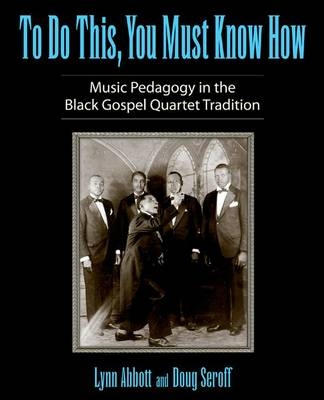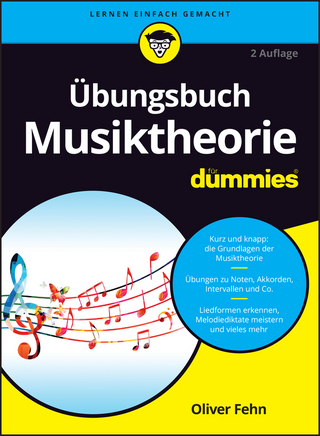
To Do This, You Must Know How
Music Pedagogy in the Black Gospel Quartet Tradition
Seiten
2013
University Press of Mississippi (Verlag)
978-1-61703-675-0 (ISBN)
University Press of Mississippi (Verlag)
978-1-61703-675-0 (ISBN)
- Titel nicht im Sortiment
- Artikel merken
Traces black vocal music instruction and inspiration from the halls of Fisk University to the mining camps of Birmingham and Bessemer, Alabama, and on to Chicago and New Orleans.
To Do This, You Must Know How traces black vocal music instruction and inspiration from the halls of Fisk University to the mining camps of Birmingham and Bessemer, Alabama, and on to Chicago and New Orleans. In the 1870s, the Original Fisk University Jubilee Singers successfully combined Negro spirituals with formal choral music disciplines, and established a permanent bond between spiritual singing and music education. Early in the twentieth century there were countless initiatives in support of black vocal music training conducted on both national and local levels. The surge in black religious quartet singing that occurred in the 1920s owed much to this vocal music education movement.
In Bessemer, Alabama, the effect of school music instruction was magnified by the emergence of community-based quartet trainers who translated the spirit and substance of the music education movement for the inhabitants of working-class neighborhoods. These trainers adapted standard musical precepts, traditional folk practices, and popular music conventions to create something new and vitalBessemer's musical values directly influenced the early development of gospel quartet singing in Chicago and New Orleans through the authority of emigrant trainers whose efforts bear witness to the effectiveness of ""trickle down"" black music education. A cappella gospel quartets remained prominent well into the 1950s, but by the end of the century the close harmony aesthetic had fallen out of practice, and the community-based trainers who were its champions had virtually disappeared, foreshadowing the end of this remarkable musical tradition.
To Do This, You Must Know How traces black vocal music instruction and inspiration from the halls of Fisk University to the mining camps of Birmingham and Bessemer, Alabama, and on to Chicago and New Orleans. In the 1870s, the Original Fisk University Jubilee Singers successfully combined Negro spirituals with formal choral music disciplines, and established a permanent bond between spiritual singing and music education. Early in the twentieth century there were countless initiatives in support of black vocal music training conducted on both national and local levels. The surge in black religious quartet singing that occurred in the 1920s owed much to this vocal music education movement.
In Bessemer, Alabama, the effect of school music instruction was magnified by the emergence of community-based quartet trainers who translated the spirit and substance of the music education movement for the inhabitants of working-class neighborhoods. These trainers adapted standard musical precepts, traditional folk practices, and popular music conventions to create something new and vitalBessemer's musical values directly influenced the early development of gospel quartet singing in Chicago and New Orleans through the authority of emigrant trainers whose efforts bear witness to the effectiveness of ""trickle down"" black music education. A cappella gospel quartets remained prominent well into the 1950s, but by the end of the century the close harmony aesthetic had fallen out of practice, and the community-based trainers who were its champions had virtually disappeared, foreshadowing the end of this remarkable musical tradition.
Lynn Abbott works for the Hogan Jazz Archive at Tulane University. With Doug Seroff, he has also co-written Out of Sight: The Rise of African American Popular Music, 1889-1895 and Ragged but Right: Black Traveling Shows, ""Coon Songs,"" and the Dark Pathway to Blues and Jazz, both published by the University Press of Mississippi.|Doug Seroff is an independent scholar living in Greenbrier, Tennessee. With Lynn Abbott, he has also co-written Out of Sight: The Rise of African American Popular Music, 1889-1895 and Ragged but Right: Black Traveling Shows, ""Coon Songs,"" and the Dark Pathway to Blues and Jazz, both published by the University Press of Mississippi.
| Erscheint lt. Verlag | 28.2.2013 |
|---|---|
| Reihe/Serie | American Made Music Series |
| Zusatzinfo | 1160 black & white |
| Verlagsort | Jackson |
| Sprache | englisch |
| Maße | 203 x 254 mm |
| Themenwelt | Kunst / Musik / Theater ► Musik |
| Sozialwissenschaften ► Ethnologie | |
| Sozialwissenschaften ► Soziologie | |
| ISBN-10 | 1-61703-675-7 / 1617036757 |
| ISBN-13 | 978-1-61703-675-0 / 9781617036750 |
| Zustand | Neuware |
| Haben Sie eine Frage zum Produkt? |
Mehr entdecken
aus dem Bereich
aus dem Bereich


